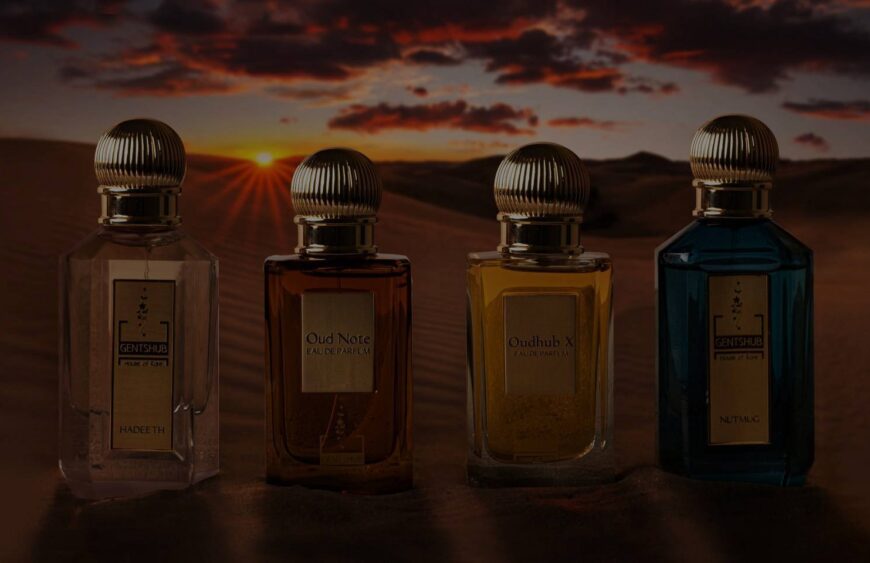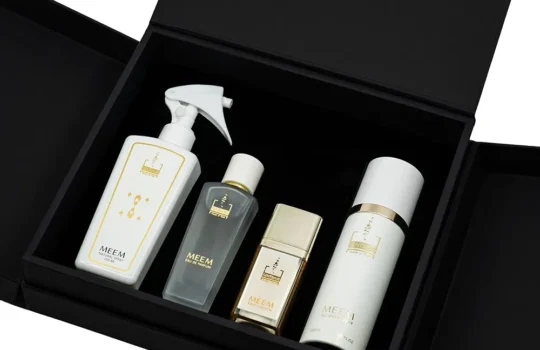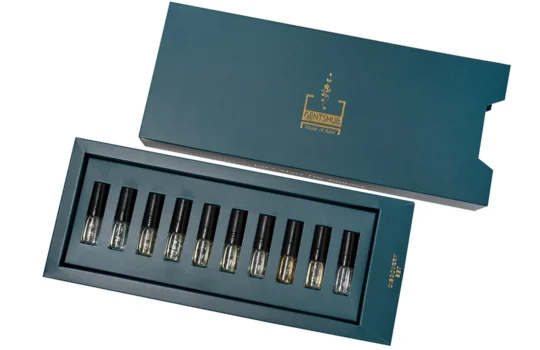Introduction
Are you tired of wearing the same fragrance that doesn’t truly reflect your personality? Perhaps you’ve stood in a perfume shop overwhelmed by endless bottles, unsure of which one actually suits you. That’s where scent profiling comes in.
Your scent profile is like your personal fragrance fingerprint—it tells the story of your personality, style, and mood through carefully balanced fragrance notes. Just like your fashion choices and music taste, your perfume says something about who you are without you even speaking a word.
In this article, we’ll explore what a scent profile is, the fascinating history of perfumery, how fragrance notes work, and practical tips on choosing the right perfume for your personality, season, and lifestyle. By the end, you’ll have all the tools you need to find your signature fragrance and leave a lasting impression everywhere you go.
Understanding What is a Scent Profile
A Scent Personality Match, also known as a fragrance profile or olfactory profile, refers to the unique blend of fragrance notes that make up a perfume. It is the “DNA” of a fragrance—what makes it floral, woody, spicy, fresh, or a combination of several families.
A typical scent profile consists of three layers of fragrance notes:
-
Top Notes: The first impression of a perfume. These scents are light, fresh, and evaporate quickly (e.g., citrus, bergamot, lavender).
-
Middle/Heart Notes: The true essence of the perfume that emerges after the top notes fade. They are usually floral, fruity, or spicy.
-
Base Notes: The lasting foundation of the fragrance, often woody, musky, or sweet, lingering for hours after application.
When combined, these notes create a fragrance journey that evolves on your skin, adapting to your body chemistry and surroundings.
The Fascinating History of Scent Profiling and Perfumery
The art of perfumery dates back thousands of years:
-
Ancient Egypt: Perfumes were used in religious ceremonies and embalming. Cleopatra famously used exotic oils to seduce Julius Caesar and Mark Antony.
-
Ancient Greece & Rome: Scents symbolized luxury, beauty, and even social status.
-
Middle Ages: Perfumery developed in the Arab world, with the discovery of distillation techniques for extracting essential oils.
-
Modern Perfumery: France became the hub of perfume making in the 17th century, with Grasse becoming the world’s perfume capital. Today, perfumery blends both art and science, allowing individuals to choose fragrances based on scent profiling.
- India: Ayurveda incorporated natural fragrances like sandalwood, rose, and jasmine not just for beauty but for healing and meditation. Incense and oils were part of spiritual practice.
-
China: Fragrances were used to purify spaces, symbolizing harmony between body and spirit.
-
Arab World: The discovery of distillation techniques by Avicenna (a Persian polymath) revolutionized perfumery. Rosewater and oud became treasures of trade routes.
-
European Renaissance: Perfume was considered both luxury and hygiene. In France, royals like Louis XIV were so obsessed with fragrance that he was called le Roi Parfumé (the Perfumed King)
The concept of scent profiling became popular in modern times as people began to seek fragrances that reflect their unique personality rather than simply following trends.
How Does a Scent Profile Work?
Your scent profile is more than just picking a perfume that smells nice—it’s about how the fragrance interacts with your body chemistry.
-
Skin Chemistry: The same perfume can smell different on two people because of differences in skin pH, moisture, and even diet.
-
Longevity: Some fragrances last longer depending on your skin type (oily skin retains fragrance better than dry skin).
-
Projection (Sillage): This refers to how far your scent “travels” and how strongly others perceive it.
In short, a perfume is not just sprayed—it evolves, adapts, and tells your personal story through its scent profile.
Types of Scent Profiles
Perfumes are categorized into olfactory families, each representing different moods, personalities, and occasions. Let’s explore the most popular ones:
Floral Fragrances
-
Soft, romantic, and feminine.
-
Common notes: rose, jasmine, lily, peony.
-
Perfect for everyday wear and romantic settings.
Woody Fragrances
-
Warm, earthy, and sophisticated.
-
Common notes: sandalwood, cedarwood, patchouli, vetiver.
-
Ideal for formal events, winter months, or evening wear.
Citrus Fragrances
-
Fresh, energizing, and uplifting.
-
Common notes: lemon, orange, bergamot, grapefruit.
-
Best for summer, work settings, and casual outings.
Oriental & Spicy Fragrances
-
Exotic, bold, and sensual.
-
Common notes: amber, vanilla, cinnamon, cardamom.
-
Perfect for nighttime, romantic dinners, or special occasions.
Fresh & Aquatic Scents
-
Clean, crisp, and invigorating.
-
Common notes: sea breeze, cucumber, green tea, mint.
-
Great for gym sessions, hot weather, or office wear.
Gourmand Fragrances
-
Sweet, edible, and deliciously addictive.
-
Common notes: chocolate, caramel, coffee, vanilla.
-
Perfect for cozy evenings and autumn/winter.
The Role of Perfume Notes
Understanding fragrance notes is crucial when choosing your scent profile:
-
Top Notes (First Impression): Citrus, herbs, or light fruits.
-
Heart Notes (The Character): Floral, spicy, fruity.
-
Base Notes (The Memory): Woody, musky, sweet.
A well-balanced perfume blends these layers seamlessly, ensuring the scent evolves beautifully over time.
How to Choose A Scent Profile
Choosing the right fragrance can feel overwhelming, but here are some practical tips:
-
Match your fragrance with your personality (romantic = floral, adventurous = woody, bold = oriental).
-
Think about your lifestyle (professional perfumes for work, playful scents for weekends).
-
Choose perfumes for occasions (light daytime scents, strong evening fragrances).
-
Consider your fashion style (elegant = luxury scents, casual = fresh citrus scents).
Your perfume should feel like an extension of your personality.
Factors to Consider When Selecting a Scent
-
Season: Light citrus scents for summer, warm woody ones for winter.
-
Occasion: Work = subtle, Romantic = seductive, Casual = fresh.
-
Longevity: Check how long it lasts before buying.
-
Body Chemistry: Always test on your skin, not just on paper.
-
Budget: Expensive doesn’t always mean better—there are many affordable perfumes with amazing scent profiles.
The Psychology of Fragrance
Scents are deeply tied to memory and emotions. A particular perfume may remind you of your childhood, a loved one, or a special event.
-
Confidence: Wearing the right scent can make you feel more powerful.
-
Attraction: Certain notes like vanilla and musk are scientifically proven to enhance attraction.
-
Mood Boosting: Citrus and mint can uplift mood, while lavender and chamomile calm the mind.
Fragrance isn’t just about smelling good—it’s about feeling good too.
Tips for Experimenting with Different Scent Profiles
-
Always test perfumes on skin, not just blotter strips.
-
Wear it for a full day—the dry-down may surprise you.
-
Try fragrance layering (using body lotion and perfume of similar notes).
-
Visit perfume boutiques and request samples.
-
Keep a fragrance journal to note how different perfumes make you feel.
Understanding the Art of Scent Profiling
Scent profiling is about customizing your fragrance wardrobe. Some people have one signature scent, while others enjoy different perfumes for different moods and occasions.
Fragrance houses now even offer personalized consultations where experts analyze your preferences and recommend tailored perfumes.
Unleashing the Power of Scent on Mood and Well-being
-
Relaxation: Lavender, chamomile, sandalwood.
-
Energy Boost: Citrus, mint, ginger.
-
Romantic Vibes: Rose, jasmine, vanilla.
-
Focus & Productivity: Rosemary, eucalyptus, green tea.
Using perfumes, essential oils, or scented candles can improve not just how you smell, but also how you feel.
Choosing a Scent Profile for Men
-
Professional Settings: Woody and citrus (sandalwood, bergamot).
-
Casual Daytime: Fresh aquatic scents.
-
Romantic Evenings: Spicy oriental notes (amber, cardamom, vanilla).
Choosing a Scent Profile for Women
-
Everyday Wear: Floral and citrus.
-
Office Wear: Subtle musky and powdery scents.
-
Special Events: Rich oriental or gourmand perfumes.
Seasonal Fragrance Profile Guide
-
Spring: Fresh florals like rose, peony, jasmine.
-
Summer: Citrus and aquatic notes (lemon, sea breeze).
-
Autumn: Warm spicy notes (cinnamon, amber, patchouli).
-
Winter: Rich woody and gourmand scents (sandalwood, vanilla, coffee).
Affordable Perfumes Notes Explained with Great Scent Profiles
You don’t need to spend a fortune. Brands like Oudera, and GENTSHUB offer perfumes with impressive longevity and scent quality at affordable prices.
Luxury Perfumes and Signature Scent Profiles
If you’re looking for exclusivity and sophistication, luxury brands like Chanel, Dior, Oudera, Lattar, and Manazone are timeless choices. They often have unique compositions and better performance.
DIY and Custom Scent Profiles
Want something truly personal? Try:
-
Blending essential oils at home.
-
Using DIY perfume kits.
-
Visiting perfumers who create custom fragrances based on your personality.
Scent Layering Techniques
-
Pair a citrus body lotion with a woody perfume.
-
Layer floral with gourmand for depth.
-
Avoid mixing clashing notes (e.g., heavy musk with citrus).
The Future of Scent Profiling
Technology is shaping perfumery with:
-
AI fragrance recommendations.
-
Sustainable perfume production.
-
Virtual fragrance consultations.
The future promises even more personalized experiences.
Common Mistakes When Choosing a Scent Profile
-
Buying a perfume because it’s trendy.
-
Not testing how it smells after hours.
-
Wearing the same scent all year round.
-
Ignoring your body chemistry.
Fragrance Storage and Maintenance
-
Store perfumes in cool, dark places.
-
Avoid direct sunlight and heat.
-
Perfumes usually last 3–5 years before losing potency.
Top Fragrance Brands and Their Scent Profiles
-
Dior: Timeless elegance.
-
Chanel: Classic and luxurious.
-
Tom Ford: Bold and sensual.
-
Oudera: luxurious and fresh.
-
GENTSHUB: Affordable luxury for modern men and women.
FAQs about Scent Profiles
What is a scent profile?
It is the unique combination of fragrance notes that defines a perfume’s personality and smell.
How do I find my scent profile?
Experiment with different fragrance families and see which notes resonate with your personality and lifestyle.
How do perfume notes affect longevity?
Base notes determine how long a fragrance lasts, while top notes fade quickly.
Can I have more than one scent profile?
Absolutely! Many people build a fragrance wardrobe for different moods and occasions.
Are expensive perfumes always better?
Not necessarily. Many affordable perfumes rival luxury brands in performance and quality.
What is the difference between niche and designer fragrances?
Designer fragrances are mass-produced, while niche perfumes are exclusive, often with unique scent compositions.
How long should a good perfume last on skin?
Most perfumes last 4–8 hours, depending on concentration. Eau de Toilette is lighter, while Eau de Parfum and Parfum have higher oil concentrations and longer longevity.
Can men wear women’s perfumes and vice versa?
Yes! Many perfumes are unisex. For example, Jo Malone fragrances are designed for layering across genders. What matters is how the perfume feels on you, not the marketing label.
What’s the difference between Eau de Toilette and Eau de Parfum?
Eau de Toilette (EDT) has about 5–15% perfume oil concentration, making it lighter. Eau de Parfum (EDP) has 15–25%, meaning it lasts longer and projects more strongly.
How many perfumes should I own?
It depends on lifestyle. A fragrance wardrobe usually includes at least 3 perfumes: one daily wear, one evening/romantic, and one seasonal/fresh scent.
Is it okay to layer perfumes?
Yes, if done carefully. For example, layering a citrus cologne with a vanilla base creates depth. However, avoid mixing clashing scents like sharp citrus with heavy musk.
Do perfumes smell stronger on clothes or skin?
Perfumes last longer on clothes, but they evolve more beautifully on skin because of body heat and chemistry. Ideally, apply on both pulse points and fabric for balance.
Conclusion
Your scent profile is a reflection of your unique personality, mood, and lifestyle. Whether you prefer fresh florals, bold orientals, or comforting gourmands, the right fragrance can boost your confidence, elevate your mood, and make a lasting impression.
So, the next time you shop for perfumes, remember to consider your personality, season, and lifestyle. With brands like GENTSHUB offering affordable and luxury-inspired fragrances, finding your perfect scent profile has never been easier.
Smell irresistible. Smell like YOU. 🌸✨

























